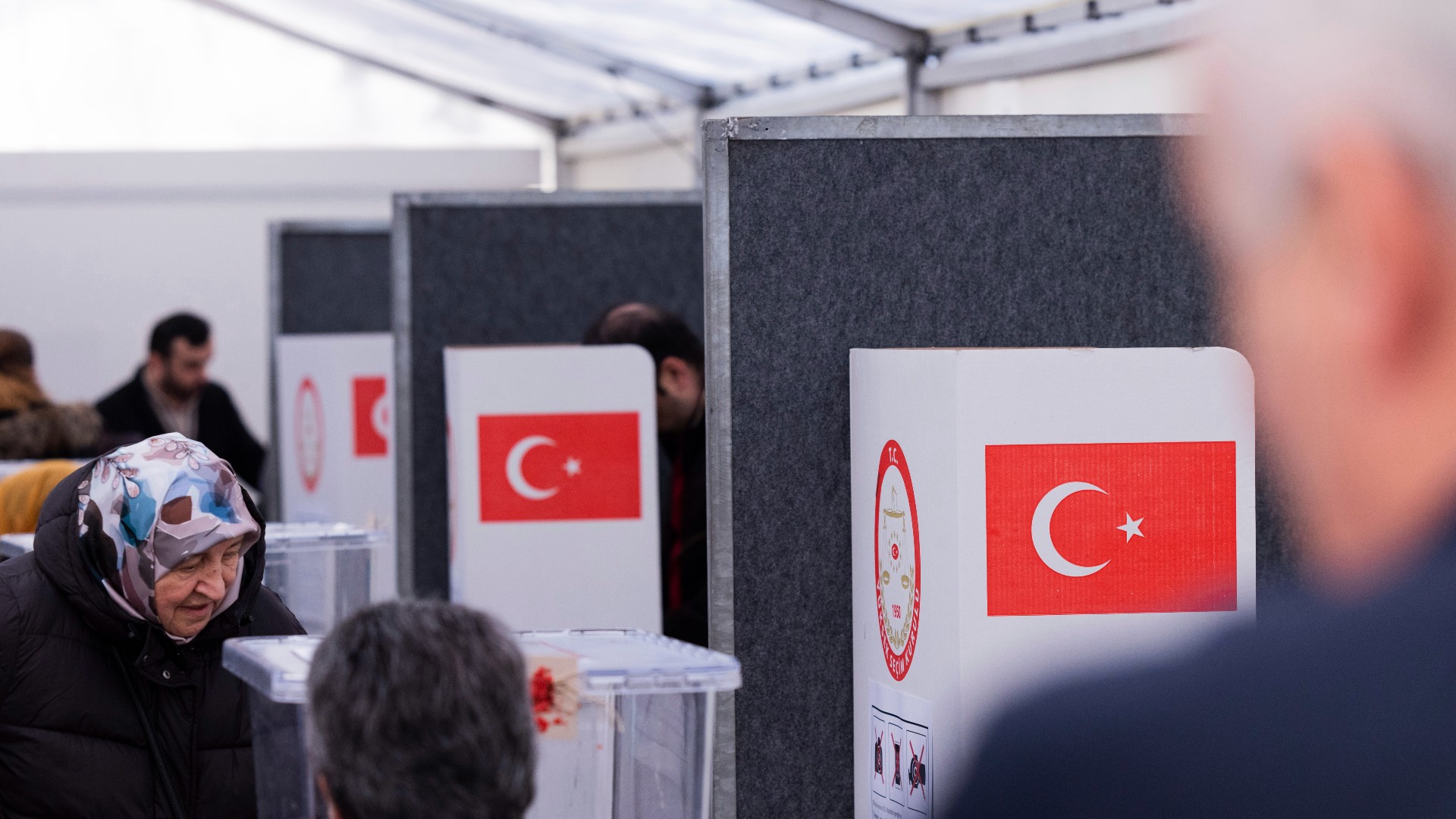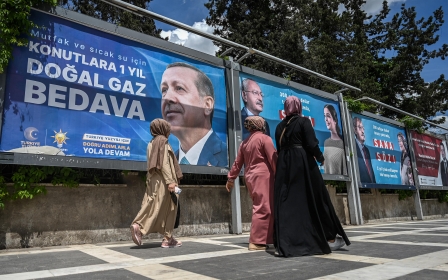Turkey elections: Voters in Germany torn between Erdogan and Kilicdaroglu

While Turks living in Turkey have to wait until 14 May to cast their vote in the upcoming presidential and parliamentary elections, voting for Turks registered abroad began on Thursday 27 April and will be open until 9 May.
The largest bloc outside of Turkey is in Germany, where more than 1.5 million people are eligible to vote, making them an important voice in shaping the future of the country. This year, they are voting at 16 stations across Germany, three more than in 2018.
Berlin, however, has denied Ankara's request to have as many as 10 more polling stations, likely hampering voter turnout.
"This decision complicates the voting process and forces Turkish citizens to take into account longer journeys and waiting periods," Oguz Ucuncu, a parliamentary candidate for the ruling Justice and Development Party (AKP) seeking to represent European-Turks, told MEE.
Fatih Zingal, a spokesperson for the AKP-affiliated Union of International Democrats, described the decision as an attempt to "sabotage" people's democratic rights.
Stay informed with MEE's newsletters
Sign up to get the latest alerts, insights and analysis, starting with Turkey Unpacked
In a tight election race between the incumbent Erdogan and Kemal Kilicdaroglu, leader of the main secular opposition party, the CHP, or Republican People's Party, the diaspora vote could impact the election by as much as half a percent.
Switching sides
Ahmet, 30, a research assistant at a university, was born and raised in the German city of Hamburg. A second generation Turkish-German citizen, he has in the past voted for Erdogan. This time, however, he says he will likely be voting for Kilicdaroglu.
"While I am still quite reluctant to switch my vote, the CHP, alongside the other coalition partners, are promising a more competent and transparent form of governing," Ahmet told MEE.
The "common ground" found between the coalition partners prior to going to polls, a rarity in past Turkish elections, has given Ahmet a cause for optimism that Kilicdaroglu could bring a different style of leadership.
"I believe there is a bond of trust and competence between these parties. By giving smaller coalition partners positions in the parliamentary candidate lists, the CHP has chosen to be more inclusive," said Ahmet.
Ahmet's wife, Tugba, however, is undecided.
"CHP has a long story of anti-Muslim secularism, and Kilicdaroglu is not a promising political figure to overcome the challenges that Turkey is facing," she told MEE.
While Kilicdaroglu has promised that there will not be a return to anti-Muslim campaigns by the secularist establishment that included banning women with headscarves from public buildings and higher educational establishments, the memory of that era runs deep and is intergenerational.
"On the other hand, the AK Party and Erdogan have ruled Turkey so long that they have lost their energy and understanding of the common good," said Tugba. Erdogan has been president since 2014, and immediately before that served as prime minister from 2003.
Despite such misgivings, there is a deep reserve of support for Erdogan amongst Turks in Germany, much to the chagrin of some German politicians and other public figures.
'Ostracised' for supporting Erdogan
Hostility towards Turks who express public support for Erdogan can have consequences in Germany.
Elif, not her real name, was born and raised in Germany's North-Rhine Westphalia state and is a third-generation Turkish-German citizen.
The 32-year-old communication expert, who works at a German company specialising in computing, asked for her real name not to be used because as an Erdogan supporter she feels that it could impact her career.
'If you support President Erdogan, if you are an AK Party supporter or even remotely sympathise with him, you can be ostracised, condemned and even lose your job'
- Elif, Turkish voter in Germany
"Especially since 2013, there has been a growing attitude against Turkey in Germany. If you support President Erdogan, if you are an AK Party supporter or even remotely sympathise with him, you can be ostracised, condemned and even lose your job," Elif said.
"In the past, I was treated as an ignorant person who doesn't understand anything, just because I hinted that I found Erdogan's policies correct in many ways."
For many conservative Turkish-Germans, the growth of the Turkish economy, its growing footprint on the international stage, its military prowess and Erdogan's willingness to call out perceived European double standards, have meant that their country can now hold its own.
"I think Turkey has come of age. Of course, there are economic problems, but we cannot think of these problems independently of the [2013] Gezi protests and the [2016] 15 July attempted coup," said Elif.
"The fight against [Kurdish] PKK terrorism, the big projects in the defence industry, Turkey's mediation and wheat agreement between Ukraine and Russia while even Europe was helpless, serious investments in such as domestic cars, tanks, combat aircraft and projects that produce added value have all come about because of Erdogan," she said.
Meanwhile, Caner Aver, an expert on German-Turkish relations at the Center for Turkish Studies and Integration Research in Essen believes that while the AKP will once again be the strongest force in the upcoming elections, it is unlikely to hold the clear lead it held in the 2018 elections.
"Some AKP supporters will probably rather not vote than vote for the opposition out of alienation towards their own party in protest," said Aver.
In the past few decades, the AKP has devoted considerable effort, time and money towards creating a network of organisations in a bid to tap into the economic and political opportunities that the diaspora presents.
While the predominantly devout nature of AKP voters creates "ideological proximity" to Erdogan, the Turkish president also "symbolises a strong charismatic statesman whom they can look up to with pride, and Erdogan offers them a home," said Aver.
"This is particularly relevant for frustrated people with experiences of exclusion and influence on their sense of belonging when they do not feel at home in Germany," Aver said. "They also compare the developments in the country with the previous governments in the areas of economic infrastructure, health care, transportation, industry or the defence industry."
Middle East Eye delivers independent and unrivalled coverage and analysis of the Middle East, North Africa and beyond. To learn more about republishing this content and the associated fees, please fill out this form. More about MEE can be found here.






